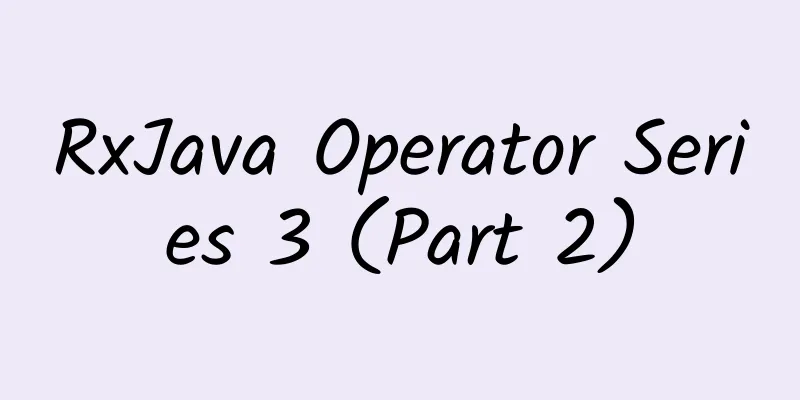RxJava Operator Series 3 (Part 2)

|
Continued from previous article Take The Take operator modifies the behavior of an Observable to return only the first N items of data, then emit a completion notification and ignore the remaining data.
Output log information
Like skip, take also has two other overloaded methods: take(long time, TimeUnit unit) and take(long time, TimeUnit unit, Scheduler scheduler), which are executed on the computation scheduler by default. take also has a variant operator TakeLast, takeLastBuffer. The specific execution effect can be coded by yourself. Debounce This operator means that a data is emitted only when no data is emitted after a specified period of time. It may sound a bit confusing. You can understand it as filtering the results generated by the source Observable interval. If no other results are generated within this specified interval, the result is submitted to the subscriber, otherwise the result is ignored. The principle is a bit like optical image stabilization. On the code
Output information
The output data may not be the same, it may start from 5. Distinct This is relatively easy to understand. It filters out duplicate data and only allows data items that have not yet been emitted to pass. Sample Code
Output log information
ElementAt This operator gets the data item at the specified index position of the data sequence emitted by the original Observable, and then emits it as its own first data. Pass it a 0-based index value, and it will emit the value of the corresponding index position of the original Observable data sequence. If the value you pass to elementAt is 4, it will emit the data of the 5th item. The following example code
Output log information
IgnoreElements The operator suppresses all data emitted by the original Observable and only allows its termination notification (onError or onCompleted) to pass through. The onNext() method will not be executed using this operator.
After execution, only onCompleted will be output. The effect of this operator is just like the empty() method to create an empty Observable, and only the onCompleted() method will be executed. The difference is that ignoreElements processes the data source, while empty() creates an Observable. |
<<: RxJava Operator Series 3 (Part 1)
>>: A collection of ViewHolder tool classes
Recommend
6 tips for attracting new customers in 2020!
During the epidemic, affected by the epidemic, ma...
How to plan a screen-sweeping event, 4 tips!
How to plan a screen-sweeping event? Just read th...
[Dry Goods] APP Promotion Notes: 100-day channel promotion summary!
Before I started, I had heard of various methods ...
Three core keys to creating explosive articles through new media operations!
There is actually a fixed template for hot articl...
Can Cordyceps sinensis be eaten by people with high blood pressure?
Everyone knows that people with high blood pressu...
Make money together·Automatic cross-border independent station without source of goods [no plug-in provided]
Make US dollars together·No source of goods, auto...
Darwin was wrong? I didn't expect to come to this conclusion while singing karaoke...
Compiled by: Gong Zixin What does it feel like to...
Kuaishou short video product analysis!
Short videos have become a part of our daily live...
How much does it cost to be a Hami mobile mini program agent? What is the quote for Hami mobile mini program agent?
Hami mobile app agents are generally divided into...
Brand Marketing: How to create advertisements that users like?
Some time ago, I wrote an article about practical...
Dapeng Education PS characters to hand-drawn, PS illustration hand-drawn tutorial!
Dapeng Education’s PS to hand-drawing course syst...
What do you think about bringing Face ID to Mac computers?
Face ID is undoubtedly a highlight of Apple's...
Is toothpaste afraid of water? Will it be ineffective if you dip it in water?
There is a long-standing topic on the Internet: s...
Unlocking new ways to enjoy smart travel, Volvo Cars debuts its new XC60 at the Shanghai Auto Show
Volvo Cars unlocks new ways to enjoy smart mobili...
When a child asks you what "danger" is, how do you answer?
There are many dangers lurking in modern life❗ To...




![Gentle White is Not White · Douyin 0-cost project: single-day income of 500, no work release, no account maintenance [video course]](/upload/images/67cc28259e7a5.webp)




